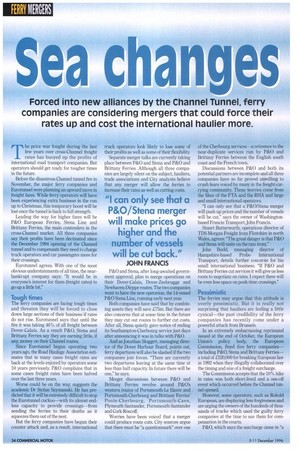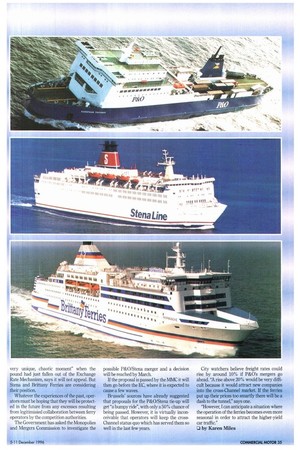Sea changes
Page 36

Page 37

If you've noticed an error in this article please click here to report it so we can fix it.
Forced into new alliances by the Channel Tunnel, ferry companies are considering mergers that could force their rates up and cost the international haulier more.
The price war fought during the last few years over cross-Channel freight rates has buoyed up the profits of international road transport companies. But operators should get ready for tougher times in the future.
Before the disastrous Channel tunnel fire in November, the major ferry companies and Eurotunnel were planning an upward move in freight fares. While ferry operators will have been experiencing extra business in the run up to Christmas, this temporary boost will be lost once the tunnel is back to full strength.
Leading the way for higher fares will be P&O European Ferries, Stena Line and Brittany Ferries, the main contenders in the cross-Channel market. All three companies say their profits have been decimated since the December 1994 opening of the Channel tunnel and to compensate they need to charge truck operators and car passengers more for their crossings.
Eurotunnel agrees. With one of the most obvious understatements of all time, the nearbankrupt company says: "It would be in everyone's interest for them (freight rates) to go up a little bit."
Tough times
The ferry companies are facing tough times and threaten they will be forced to close down large sections of their business if rates do not rise. Eurotunnel says that until the fire it was taking 46% of all freight between Dover-Calais. As a result P&O, Stena and Brittany Ferries say they are earning little, if any, money on their Channel routes.
Since Eurotunnel began operating two years ago, the Road Haulage Association estimates that in many cases freight rates are back at the levels enjoyed by operators some 10 years previously. P&O complains that in some cases freight rates have been halved over the last three years.
Worse could be on the way, suggests the academic Dr Stefan Szymanski. He has predicted that it will be extremely difficult to stop
the Eurotunnel cuckoo with its almost endless capacity to provide crossings—from sending the ferries to their deaths as it squeezes them out of the nest.
But the ferry companies have begun their counter attack and, as a result, international truck operators look likely to lose some of their profits as well as some of their flexibility Separate merger talks are currently taking place between P&O and Stem and P&O and Brittany Ferries. Although all three companies are largely silent on the subject, hauliers, trade associations and City analysts believe that any merger will allow the ferries to increase their rates as well as cutting costs.
P&O and Stena, after long-awaited government approval, plan to merge operations on their Dover-Calais, Dover-Zeebrugge and Newhaven-Dieppe routes. The two companies want to have the new operation, the 14-vessel P&O Stena Line, running early next year.
Both companies have said that by combining assets they will save 175m. But there are also concerns that at some time in the future they may cut out routes to further cut costs. After all, Stena quietly gave notice of ending its Southampton-Cherbourg service just days after announcing it was in talks with P&O.
And as Jonathan Sloggett, managing director of the Dover Harbour Board, points out, ferry departures will also be slashed if the two companies join forces. "There are currently two departures leaving at the same time at less than half capacity. In future there will be one," he says.
Merger discussions between P&O and Brittany Ferries revolve around P&O's western routes of Portsmouth-Le Havre and Portsmouth-Cherbourg and Brittany Ferries' Poole-Cherbourg, Portsmouth-Caen, Plymouth-Santander, Portsmouth-Santander and Cork-Roseoff.
Worries have been voiced that a merger could produce route cuts. City sources argue that there must be "a questionmark" over one of the Cherbourg services a reference to the near-duplicate services run by P&O and Brittany Ferries between the English south coast and the French town.
Discussions between P&O and both its potential partners are incomplete and all three companies have so far proved unwilling to crush fears voiced by many in the freight-carrying community These worries come from the likes of the FTA and the RITA and large and small international operators.
"I can only see that a P&O/Stena merger will push up prices and the number of vessels will be cut," says the owner of Washingtonbased Francis Transport, John Francis.
Stuart Butterworth, operations director of TDS Morgan Freight from Flintshire in north Wales, agrees: "The great danger is that P&O and Stena will unite on the rate front."
John Budd, managing director of Hampshire-based Probe International Transport, details further concerns for his small international business. "If P&O and Brittany Ferries cut services it will give us less room to negotiate on rates. I expect there will be even less space on peak-time crossings."
Pessimistic
The ferries may argue that this attitude is overly pessimistic. But it is really not surprising that hauliers are feeling a little cynical—the past credibility of the ferry companies has recently come under a powerful attack from Brussels.
In an extremely embarrassing reprimand issued at the end of October, the European Union's policy body, the European Commission, fined five ferry companies— including P&O, Stena and Brittany Ferries— a total of 1520,000 for breaking European law in 1992 when they illegally collaborated over the timing and size of a freight surcharge.
The Commission accepts that the 10% hike in rates was both short-lived and a one-off event which occurred before the Channel tunnel opened.
However, some operators, such as Rokold European, are displaying less forgiveness and are urging the owners of the hundreds of thousands of trucks which used the guilty ferry companies at the time to sue them for compensation in the courts.
P&O, which says the surcharge came in "a very unique, chaotic moment" when the pound had just fallen out of the Exchange Rate Mechanism, says it will not appeal. But Stena and Brittany Ferries are considering their position.
Whatever the experiences of the past, °peratom must be hoping that they will be protected in the future from any excesses resulting from legitimisied collaboration between ferry operators by the competition authorities.
The Government has asked the Monopolies and Mergers Commission to investigate the possible P&O/Stena merger and a decision will be reached by March.
If the proposal is passed by the MMC it will then go before the EC, where it is expected to cause a few waves.
Brussels' sources have already suggested that proposals for the P&O/Stena tie-up will get "a bumpy ride", with only a 50% chance of being passed. However, it is virtually inconceivable that operators will keep the crossChannel status quo which has served them so well in the last few years.
City watchers believe freight rates could rise by around 10% if P&O's mergers go ahead. "A rise above 20% would be very difficult because it would attract new companies into the cross-Channel market. If the ferries put up their prices too smartly there will be a dash to the tunnel," says one.
"However, I can anticipate a situation where the operation of the ferries becomes even more seasonal in order to attract the higher-yield car traffic."
Cl by Karen Miles








































































































